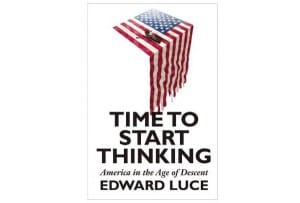A Polarized America, the Nation of Spoiled Brats, Says Columnist


Financial Times columnist Edward Luce says America is on the decline internationally and domestically and we too often act like spoiled brats. He has written a book about it, Time to Start Thinking: America in the Age of Descent.
His basic thesis is that the United Sates is losing its pragmatism and that this leads to all manner of disasters. Polarization on ideological grounds increasingly means that nothing gets done. The two sides are deeply entrenched and highly suspicious of the other. Thus, needed reforms don't happen, schools and infrastructure deteriorate, and America loses its edge. This process is aided and abetted by the “permanent election campaign” mentality which means politicians must always be raising money. The more polarized politics becomes, the easier it is to raise money by demonizing the other side. Thus the process feeds upon itself.
But his criticism goes deeper. From the Amazon review “While many Americans believe that their country can and should retain its status as a global superpower, Luce sees this as an increasingly unlikely scenario, unless Americans themselves can stand up against the country's increasingly plutocratic character.”
Luce elaborates upon his views in an interview with Foreign Policy. He says the US has not learned the lessons of the financial collapse with the elites still hewing to the old model that led to it. (This should not be a surprise since the elites are still mostly profiting from the old model.) Incomes for the middle and lower classes are dropping, unemployment is rising, and too many high-skill jobs are being replaced with lower paying ones.
Worse, our productivity and wealth is in decline as compared to the rest of the world. But politicians and too much of the populace are in denial, thinking it can somehow be “1955 again with Cadillacs with big fins rolling out of factories.” We are overly complacent and dreaming of our glory days. Plus, we tend to act spoiled, like petulant children, when things don’t go our way rather than working together towards solutions. Meanwhile China, India, Brazil, and other countries are fast moving in on our territory.
Casinos in rust belt cities like Gary, Indiana are metaphors for our broken public policy, Luce says. They provide a short-term boost by sucking the “economic vitality” out of the poor and the old while providing few lasting benefits to the community at large.
The problem, he concludes, isn’t just in Washington. The polarization is throughout the country. This is why new political ideas and movements are hugely needed. The independent voter movement is proof that millions have become disaffected with politics as usual, and want to build consensus and end the gridlock and polarization.


